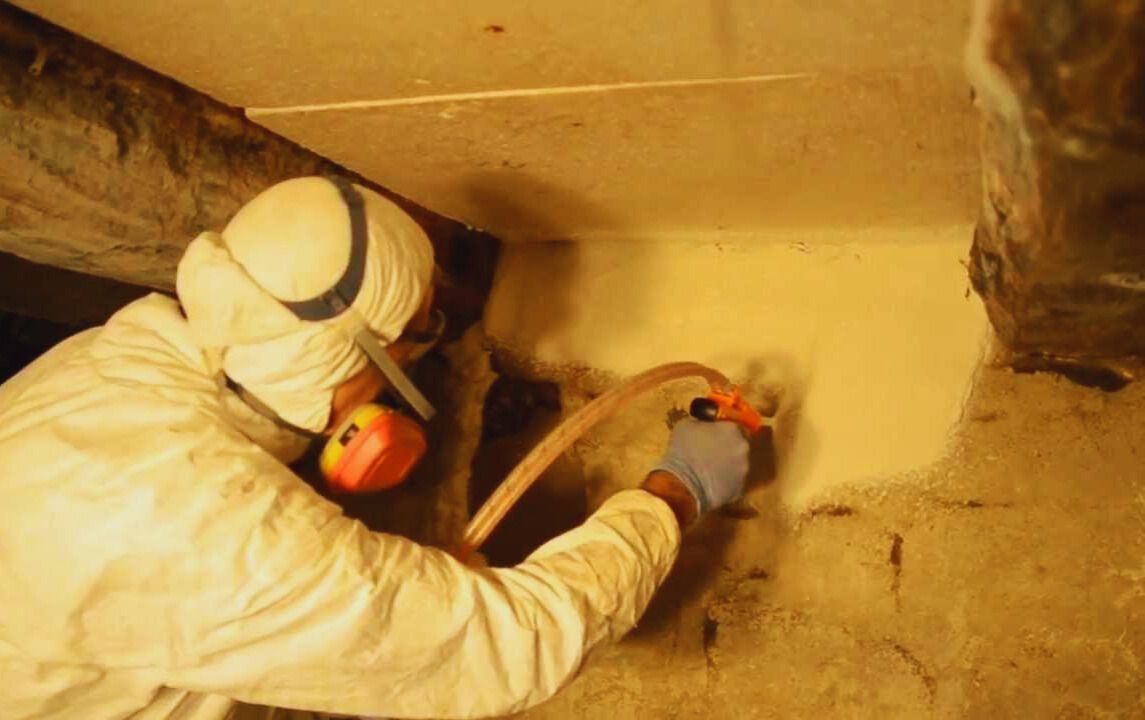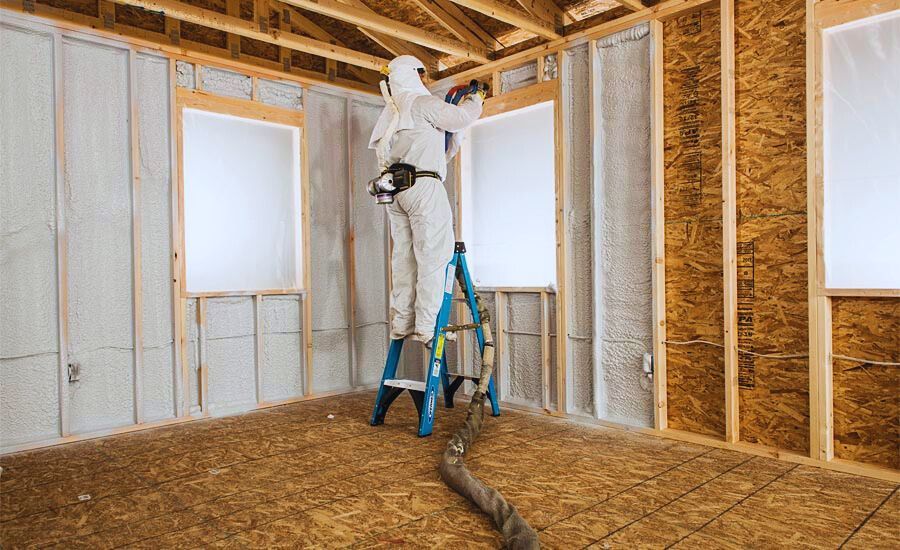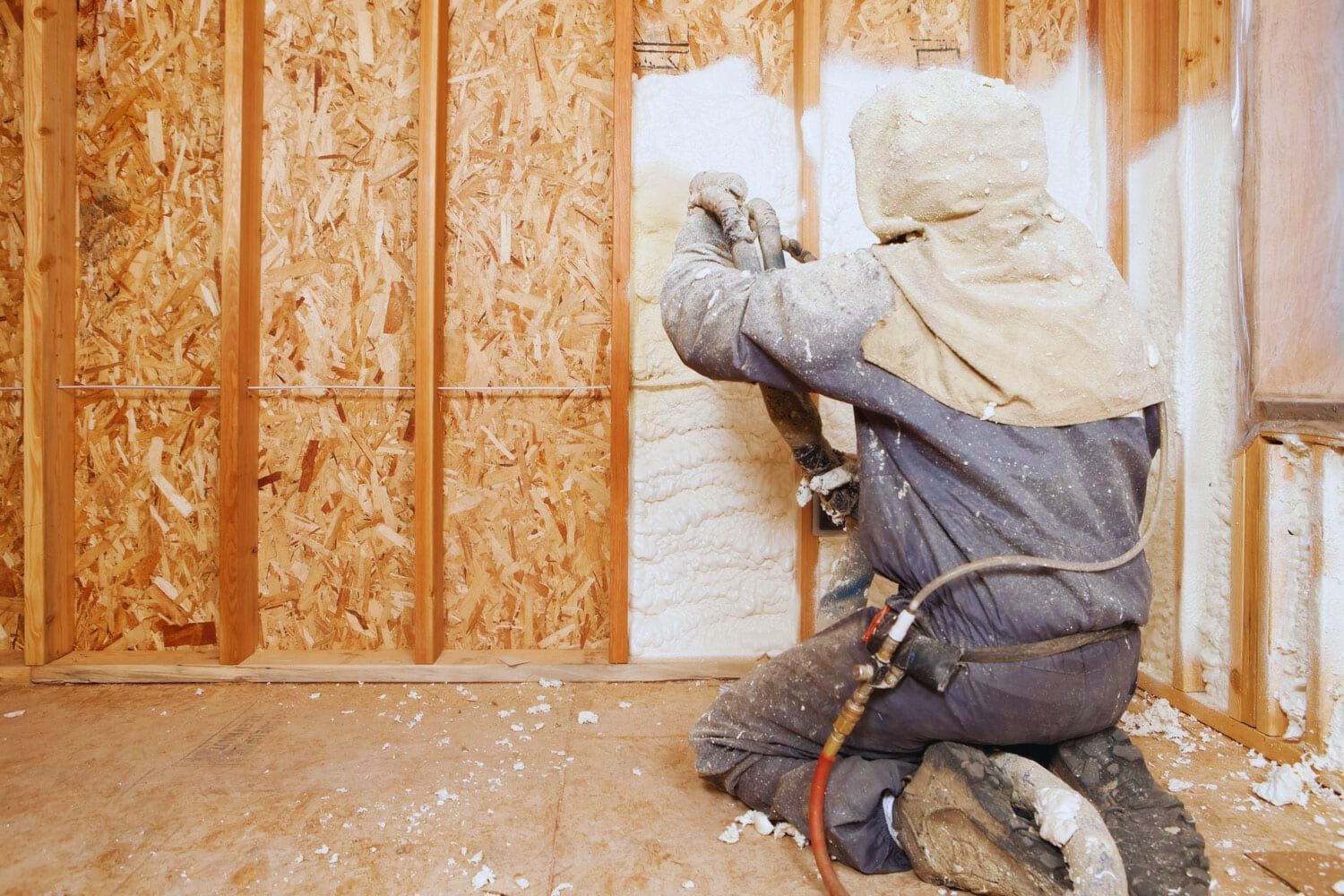By Zech Jones
•
November 27, 2024
Open cell spray foam insulation is revolutionizing home comfort and energy efficiency. This innovative insulation solution offers a range of benefits that can transform your living spaces. Open cell spray foam creates an effective air barrier, reducing drafts and improving indoor air quality while providing excellent soundproofing properties. When applied, open cell spray foam expands to fill gaps and crevices, forming a seamless barrier that traditional insulation methods often miss. This comprehensive coverage ensures better temperature control throughout your home, potentially leading to significant energy savings. We've seen many homeowners experience enhanced comfort and reduced utility bills after upgrading to open cell spray foam insulation. While the initial cost may be higher than traditional insulation options, the long-term advantages often outweigh this investment. Open cell spray foam's durability and performance can contribute to increased property value and create a more comfortable living environment for years to come. Key Takeaways Open cell spray foam creates an airtight seal, improving energy efficiency and comfort It offers superior soundproofing and can help reduce noise transmission between rooms Long-term benefits often justify the initial investment in open cell spray foam insulation Understanding Open Cell Spray Foam Insulation Open cell spray foam insulation offers unique properties that set it apart from other insulation materials. Its distinctive structure and composition provide specific benefits for home insulation. Key Characteristics of Open Cell Foam Open cell spray foam has a low density and soft, spongy texture. It expands significantly during application, filling gaps and cracks effectively. The foam's open cell structure allows for air and moisture permeability, which can be advantageous in certain situations. Its R-value ranges from 3.5 to 4 per inch, providing good insulation performance. Open cell foam is lightweight and flexible, making it easier to work with during installation and modifications. It also offers excellent sound dampening properties, reducing noise transmission between rooms or from outside. Comparison with Closed Cell Spray Foam Insulation While both types are spray polyurethane foams, they differ in structure and properties. Open cell foam is less dense and more affordable than closed cell foam. It's more breathable, allowing for better moisture management in wall assemblies. Closed cell foam has a higher R-value (6-7 per inch) and provides a better air and vapor barrier. It's more rigid and can add structural strength to walls. However, it's more expensive and doesn't expand as much during application. Open cell foam is often preferred for interior walls and attics, while closed cell foam is better suited for areas needing moisture resistance or higher insulation values. The Science Behind Spray Polyurethane Foam Spray polyurethane foam is created through a chemical reaction between two liquid components. When sprayed, these components mix and rapidly expand, forming the foam insulation. In open cell foam, tiny bubbles in the foam remain open, creating a less dense structure. This allows air to move between cells, resulting in its soft, flexible nature. The open structure also contributes to its sound-absorbing qualities and moisture permeability. The expansion process helps the foam fill irregular spaces and adhere to various surfaces, creating a seamless insulation layer. This expansion and adhesion are key factors in its effectiveness at reducing air leakage and improving energy efficiency in buildings. Advantages of Open Cell Spray Foam Insulation Open cell spray foam insulation offers numerous benefits for homeowners and builders. Its unique properties make it an excellent choice for improving energy efficiency, indoor air quality, and sound control. Energy Efficiency and Thermal Resistance Open cell spray foam provides superior insulation performance. It expands to fill gaps and cracks, creating an airtight seal that significantly reduces heat transfer. This results in lower energy bills and improved comfort. The foam's high R-value per inch helps maintain consistent indoor temperatures. It minimizes air leakage, which can account for up to 30% of a home's energy loss. We've seen many clients experience noticeable reductions in their heating and cooling costs after installing open cell spray foam. Its ability to conform to any space makes it ideal for insulating hard-to-reach areas. Indoor Air Quality and Moisture Resistance Open cell spray foam contributes to healthier indoor environments. It forms an effective air barrier, reducing the infiltration of outdoor pollutants, allergens, and dust. The foam's moisture-resistant properties help prevent mold and mildew growth. It allows water vapor to pass through, which can be beneficial in certain climates and building designs. By controlling air movement, open cell spray foam helps maintain optimal humidity levels. This creates a more comfortable living space and protects building materials from moisture damage. Soundproofing and Sound Absorption Qualities One of the lesser-known advantages of open cell spray foam is its excellent sound absorption properties. It effectively reduces noise transmission between rooms and from outside sources. The foam's open cell structure traps sound waves, diminishing echoes and reverberations. This makes it an ideal choice for home theaters, bedrooms, and offices. We've had clients report significant improvements in their home's acoustics after installing open cell spray foam. It's particularly effective in reducing low-frequency sounds that traditional insulation materials often struggle with. The Importance of Vapor Permeability Open cell spray foam's vapor permeability is a key advantage in many applications. It allows moisture to pass through, preventing trapped moisture issues in wall assemblies. This property is especially beneficial in hot, humid climates where vapor barriers can lead to moisture accumulation. The foam's breathability helps regulate moisture levels within the building envelope. We recommend open cell spray foam for attics and walls where vapor permeability is crucial. It works well with proper ventilation systems to maintain a healthy, moisture-balanced home environment. Installation and Performance Open cell spray foam insulation offers excellent air sealing capabilities and creates an effective airtight barrier. Its installation process requires professional expertise to ensure optimal performance and thermal efficiency. Air Sealing and Airtight Barrier Creation Open cell spray foam expands to fill gaps, cracks, and voids in building cavities. This expansion forms a seamless, airtight barrier that significantly reduces air leakage. By preventing air infiltration and exfiltration, open cell foam improves energy efficiency and indoor comfort. We recommend applying open cell foam to areas prone to air leakage, such as: Wall cavities Attics Crawl spaces Around windows and doors Electrical outlets and penetrations The foam's ability to conform to irregular shapes ensures comprehensive coverage, eliminating common air leakage points often missed by traditional insulation methods. The Role of Open Cell Foam as an Air Barrier Open cell foam acts as an effective air barrier due to its unique structure and properties. Its open-cell composition allows for slight air movement, which can help manage moisture in certain climates. This characteristic makes it particularly suitable for use in walls and rooflines. Key benefits of open cell foam as an air barrier include: Reduced energy costs Improved indoor air quality Enhanced comfort by eliminating drafts Minimized temperature fluctuations By creating a continuous air barrier, open cell foam helps maintain consistent indoor temperatures and reduces the workload on HVAC systems. Professional Installation Process Installing open cell spray foam insulation requires specialized equipment and expertise. We always recommend hiring certified professionals for the installation process. Here's a brief overview of the typical installation steps: Preparation: The area is cleaned and protected. Application: The foam is sprayed onto surfaces using specialized equipment. Expansion: The foam expands to fill cavities and voids. Trimming: Excess foam is trimmed for a smooth finish. Cleanup: The area is cleaned and inspected. Professional installation ensures proper mixing, application thickness, and coverage. This attention to detail maximizes the insulation's performance and longevity. Certified installers also adhere to safety protocols and building codes, ensuring a compliant and effective installation. Cost-Effectiveness and Return on Investment Open cell spray foam insulation offers significant financial benefits over time. We'll explore how the initial costs compare to long-term savings, the impact on energy bills, and the durability that makes it a smart investment. Initial Installation Costs Versus Long-term Savings Open cell spray foam typically costs $0.50 to $1.00 per board foot installed. While this is higher than traditional insulation, the long-term savings often justify the upfront expense. Energy savings can offset the initial costs within 3-5 years in many cases. This quick payback period makes open cell spray foam an attractive option for homeowners looking to improve their property's efficiency. We've seen homes reduce energy consumption by 30-50% after installing open cell spray foam. This translates to substantial utility bill savings over time. Heating and Cooling Costs Reduction Open cell spray foam creates an effective air barrier, significantly reducing heating and cooling costs. Homes insulated with this material often see a 20-30% decrease in HVAC-related expenses. The air-sealing properties prevent drafts and air leakage, allowing HVAC systems to work more efficiently. This leads to lower energy bills and increased comfort year-round. In climates with extreme temperatures, the savings can be even more pronounced. We've observed some homeowners cutting their energy bills nearly in half after upgrading to open cell spray foam. Insulation Longevity and Durability Open cell spray foam typically lasts for the lifetime of the building, often 50 years or more. This longevity means homeowners won't need to replace or supplement the insulation for decades. The material doesn't settle or sag over time, maintaining its insulating properties throughout its lifespan. This consistency ensures long-term energy efficiency and comfort. Open cell spray foam is resistant to mold and pests, reducing potential maintenance costs. Its durability protects against air infiltration and moisture issues, preserving the structure's integrity. Environmental Impact and Sustainability Open cell spray foam insulation offers significant environmental benefits through its energy-saving properties and sustainable practices. Let's explore how this insulation solution contributes to a greener future. Reduction of Environmental Footprint Through Efficient Insulation Open cell spray foam insulation dramatically reduces energy consumption in buildings. By creating an airtight seal, it minimizes heat transfer and air leakage. This results in lower heating and cooling needs, reducing overall energy usage. Buildings insulated with open cell spray foam can see up to 50% reduction in energy bills. This translates to fewer greenhouse gas emissions from power plants. The insulation's long lifespan also means less frequent replacements, further reducing waste and resource consumption. We've seen many clients achieve LEED certification with the help of open cell spray foam. Its excellent insulation performance contributes to improved building envelope efficiency. Sustainable Materials and Practices Open cell spray foam insulation is made with renewable and recycled materials. Many formulations use soy-based polyols, reducing reliance on petroleum-based products. This shift towards bio-based ingredients lowers the carbon footprint of the insulation manufacturing process. The application process of open cell spray foam also minimizes waste. It expands to fill cavities completely, leaving no gaps or excess material. This precision reduces off-cuts and waste typically associated with traditional insulation methods. We ensure proper ventilation during installation to maintain indoor air quality. Once cured, open cell spray foam is inert and does not off-gas, contributing to a healthier indoor environment. Ideal Use Cases and Applications Open cell spray foam insulation offers versatile solutions for various spaces in both residential and commercial settings. Its unique properties make it well-suited for specific applications where air sealing, sound dampening, and moisture control are crucial. Residential and Commercial Applications of Open Cell Foam We find open cell spray foam particularly effective in residential attics, where it creates an efficient thermal barrier. In homes, it excels at insulating wall cavities, providing a seamless air seal that traditional fiberglass insulation can't match. For commercial buildings, open cell foam is ideal for large, open spaces like warehouses or office buildings. Its sound-dampening qualities make it perfect for recording studios, home theaters, or any area where noise reduction is important. Open cell foam's flexibility allows it to expand and contract with building materials, reducing the risk of gaps forming over time. Application in Attics, Crawl Spaces, and Wall Cavities In attics, open cell foam can be sprayed directly onto the underside of the roof deck, creating an unvented attic space. This approach helps regulate temperature and moisture levels, potentially extending the life of roofing materials. Crawl spaces benefit greatly from open cell foam's ability to seal out moisture and pests. When applied to the walls and sometimes the ground, it creates a dry, controlled environment that protects the home's structure. For wall cavities, open cell foam fills every nook and cranny, providing superior insulation compared to traditional materials. It's especially useful in older homes with irregular framing or hard-to-reach areas. Preventing Mold Growth and Maintaining Structural Integrity Open cell foam's moisture-permeable nature allows it to dry if it gets wet, reducing the risk of trapped moisture that can lead to mold growth. This property is particularly valuable in humid climates or areas prone to water intrusion. We've seen open cell foam effectively prevent condensation in metal buildings, protecting them from rust and corrosion. In basements, it helps maintain a dry environment, crucial for preventing mold and preserving structural integrity. By creating an air-tight seal, open cell foam also helps control indoor humidity levels. This not only improves air quality but also reduces the strain on HVAC systems, potentially extending their lifespan and efficiency. Additional Considerations Open cell spray foam insulation offers many benefits, but there are a few key factors to keep in mind. We'll explore moisture management, the importance of professional installation, and how it stacks up against other insulation materials. Dealing With Condensation and Moisture Concerns Open cell spray foam is vapor permeable, allowing moisture to pass through. This can be advantageous in certain climates, as it allows walls to "breathe" and dry out if they get wet. However, proper ventilation is crucial to prevent moisture buildup. In humid environments, we recommend using a vapor barrier in conjunction with open cell foam. This helps control moisture movement and reduces the risk of condensation within walls. Regular inspections are important to catch any potential moisture issues early. We advise checking attics, crawl spaces, and other prone areas periodically. Importance of Professional Spray Foam Contractor Proper installation is critical for open cell spray foam to perform effectively. A professional contractor ensures: Correct mixing and application of chemicals Even coverage and appropriate thickness Proper safety precautions and ventilation during installation Adherence to building codes and regulations DIY installation can lead to gaps, uneven coverage, or improper chemical reactions. These mistakes can compromise insulation performance and potentially create health hazards. We strongly recommend hiring a certified spray foam contractor with experience in open cell applications. They have the necessary equipment, expertise, and safety knowledge to do the job right. Comparison With Other Insulation Types Open cell spray foam has unique properties compared to traditional insulation materials: Insulation Type R-value per inch Air Sealing Moisture Resistance Open Cell Foam 3.6 - 3.8 Excellent Moderate Fiberglass 2.2 - 2.7 Poor Poor Cellulose 3.1 - 3.8 Good Moderate Rigid Foam 3.8 - 6.5 Excellent Excellent Open cell foam excels at air sealing and filling irregular spaces. It's lighter and more flexible than closed cell foam, making it ideal for attics and wall cavities. Fiberglass and cellulose are cheaper but don't air seal as effectively. Rigid foam boards offer high R-values but can be challenging to install in existing structures. We find open cell foam strikes a good balance between performance, cost, and ease of installation for many applications.











